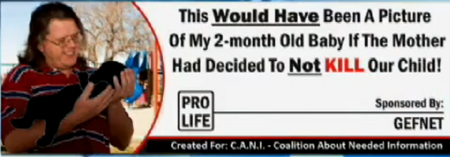Tenn. law bans posting images that “cause emotional distress”
A new Tennessee law makes it a crime to “transmit or display an image” online that is likely to “frighten, intimidate or cause emotional distress” to someone who sees it. Violations can get you almost a year in jail time or up to $2500 in fines.
The ban on distressing images, which was signed by Gov. Bill Haslam last week, is also an update to existing law. Tennessee law already made it a crime to make phone calls, send emails, or otherwise communicate directly with someone in a manner the sender “reasonably should know” would “cause emotional distress” to the recipient. If the communciation lacked a “legitimate purpose,” the sender faced jail time.
The new legislation adds images to the list of communications that can trigger criminal liability. But for image postings, the “emotionally distressed” individual need not be the intended recipient. Anyone who sees the image is a potential victim. If a court decides you “should have known” that an image you posted would be upsetting to someone who sees it, you could face months in prison and thousands of dollars in fines.
CNN’s Belief Blog Turns 1
A year ago CNN started a belief blog, here are ten things they have learned in the past year.
Read the details here.
1. Every big news story has a faith angle.
2. Atheists are the most fervent commenters on matters religious.
3. People are still intensely curious about the Bible, its meaning and its origins.
4. Most Americans are religiously illiterate.
5. It’s impossible to understand much of the news without knowing something about religion.
6. Regardless of where they fit on the spectrum, people want others to understand what they believe.
7. Americans still have an uneasy relationship with Islam.
8. God may not prevent natural disasters, but religion is always a big part of the response.
9. Apocalyptic movements come and go.
10. Most Americans don’t know that President Barack Obama is a Christian.
Jilted ex-boyfriend puts up abortion billboard

A New Mexico man’s decision to lash out with a billboard ad saying his ex-girlfriend had an abortion against his wishes has touched off a legal debate over free speech and privacy rights.
The sign on Alamogordo’s main thoroughfare shows 35-year-old Greg Fultz holding the outline of an infant. The text reads, “This Would Have Been A Picture Of My 2-Month Old Baby If The Mother Had Decided To Not KILL Our Child!”
Fultz’s ex-girlfriend has taken him to court for harassment and violation of privacy. A domestic court official has recommended the billboard be removed.
But Fultz’s attorney argues the order violates his client’s free speech rights.